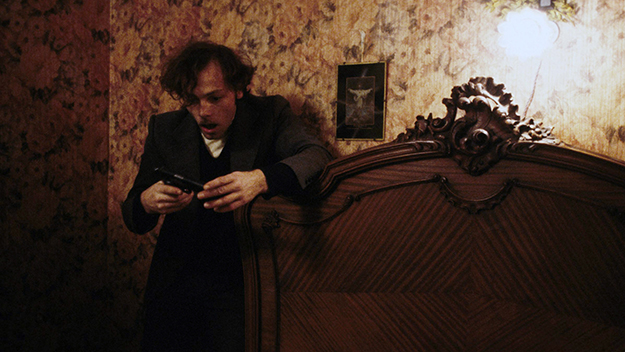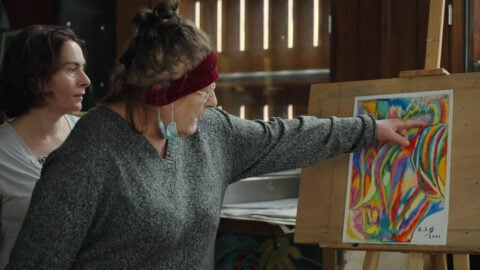Finest Hour: Patrick Dewaere in Série noire
This article appeared in the January 13, 2022 edition of The Film Comment Letter, our free weekly newsletter featuring original film criticism and writing. Sign up for the Letter here.

Patrick Dewaere in Série noire (Alain Corneau, 1979)
In 1982, French actor Patrick Dewaere took his own life at the age of 35, his final years colored by professional success, drug abuse, and deep depression. With his death, Dewaere—who would have been 73 on January 26—left behind a legacy of unparalleled precision and sensitivity as a performer that still awaits proper recognition in the U.S. His career began as part of his family’s acting troupe, the “petits Maurin,” before he changed his name (after discovering the identity of his birth father) and struck out on his own at the age of 17. In 1968, he joined the Café de la Gare, where he met his longtime partner, Miou-Miou, and his friend and cinematic foil, Gérard Depardieu.
Wider recognition arrived in the mid-1970s with the controversial sex romps Going Places (1974) and Get Out Your Handkerchiefs (1978), both co-starring Depardieu and directed by serial provocateur Bertrand Blier. In these two films, Dewaere’s elegant, almost feline features and emotional hypersensitivity are a perfect contrast to Depardieu’s hulking frame and brutish pathos. Indeed, Dewaere’s performances as the ostensible “straight man” lend Blier’s anarchic and deliberately shocking comedies much needed restraint in key moments, the actor’s Buster Keaton–like, hangdog expressions helping to ground the movies’ sexually incendiary antics.
But the most unhinged, grotesque, and intense role of the actor’s career came without Depardieu, in Alain Corneau’s Série noire (1979)–a hard-boiled crime thriller based on Jim Thompson’s A Hell of a Woman, adapted for the screen by legendary avant-garde novelist George Perec. Dewaere plays Franck Poupart, a down-and-out door-to-door salesman in Paris who meets 17-year-old Mona (Marie Trintignant) who has been forced into prostitution by her aunt. After being offered sex with Mona in exchange for some of his sad and tacky wares, usually sold to those only slightly lonelier and poorer than himself, Franck discovers that the aged and exploitative aunt has hidden a fortune in her dilapidated house. He decides to liberate both the young girl and the cash in a murderous plot. The putative hero’s desperation is matched only by his increasingly sociopathic behavior in a film that is alternately hilarious and shocking, and amoral to the core.
Série noire opens in a junkyard, with Dewaere dancing madly around his car to the tinny crackle of a small transistor radio like the world’s worst Mick Jagger impersonator. The character’s manic weirdness escalates throughout the film as he twitches and slithers from scheme to scheme, occasionally recalling Marcello Mastroianni at his most comically pathetic, but imbued with a darkness that is utterly unique to Dewaere. His Franck is part low-rent lothario, part existential loafer, and part unscrupulous opportunist, with something more sinister lurking just below the surface. As Série noire proceeds, things get more and more bleak: Franck’s estranged wife returns unexpectedly, young Mona turns out to be not quite as innocent as she seems, and Franck’s boss (played by Bernard Blier, the father of the filmmaker) begins to get suspicious of the erratic salesman. Franck lies and dissembles in the most monstrous ways, his pathetic buffoonery masking his devious and deadly (though still often poorly conceived) calculations. He uses charm and booze to con his irate former customer, the loutish Tikides (Andreas Katsulas), into helping with his plot only to double cross him later. He gladly, and perhaps even genuinely, welcomes his wife back, only to later strangle her in operatic fashion. Dewaere keeps his expressions tight, allowing glimpses of trembling humanity to flash from beneath his poker face until finally exploding at key pressure points in the film (the robbery, the murder of his wife, his ultimate rejection of Mona). Impressively, despite this volatility, through scene after tumultuous scene, Dewaere maintains a consistent emotional and psychological exactitude, his long neck and sharp profile tilted toward the sky as if he barely notices the shit raining down upon him.
The maze of lies Franck creates—and the many masks he must don to keep his scheme afloat—becomes exhausting and exhilarating. The viewer desperately attempts to keep up, but eventually, Franck’s compulsive duplicity and explosive, erratic temper place him at arm’s length, as he lies, kills, and self-destructs, all for a plan both he, and we, know is ultimately doomed to failure. Corneau’s camera seems to almost revel in this slow-motion car crash, following Dewaere through the film’s dreary spaces, sometimes at a cold distance and at other moments uncomfortably close, as if we’ve just bumped into Franck in the men’s room.
In later films like André Téchiné’s Hôtel des Amériques, Claude Sautet’s A Bad Son, and even Henri Verneuil’s corporate thriller A Thousand Billion Dollars, Dewaere would display a particular gift for portraying gentle, broken characters with deft strokes and subtle, sustained naturalism. Série noire, in its most vicious and memorable moments, requires something far beyond subtle naturalism, something grimly comical and hyperreal. When Franck finally commits the crime and robs Mona’s aunt, what had originally seemed to be a simple—and to a certain extent, heroic—rescue of a captive girl becomes a ballet of lust, burglary, and murder. Franck, his face pale and gleaming with sweat, glides up and down the stairs with comic grace, legs stretching before him like a live-action Looney Tunes character, the camera following breathlessly. The sequence is a tornado of grisly details—including a corpse being moved like a sack of dirty laundry—with its pitch-black humor prefiguring the postmodern crime pictures of Tarantino and his ilk. Dewaere’s performance, simultaneously out of control, spastic, and somehow cool as a cucumber, is the beating black heart of it all.
Chris Shields is a Los Angeles–based film writer and filmmaker.







